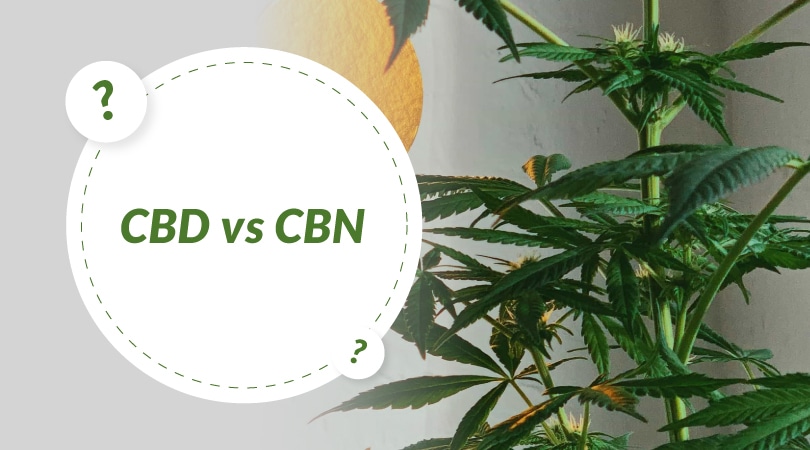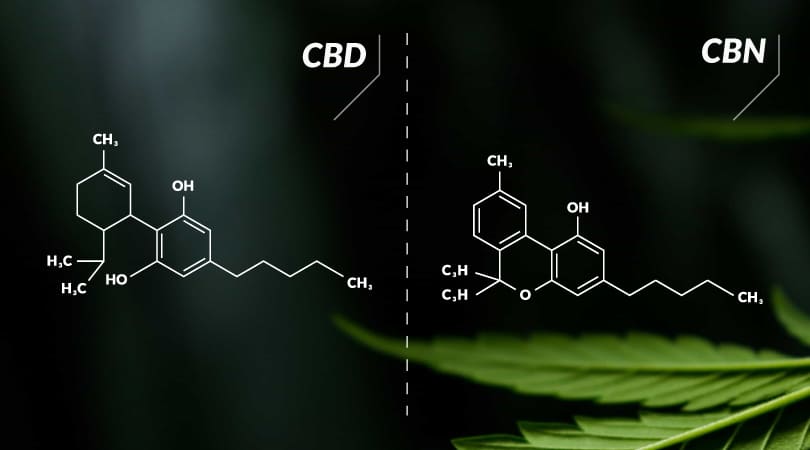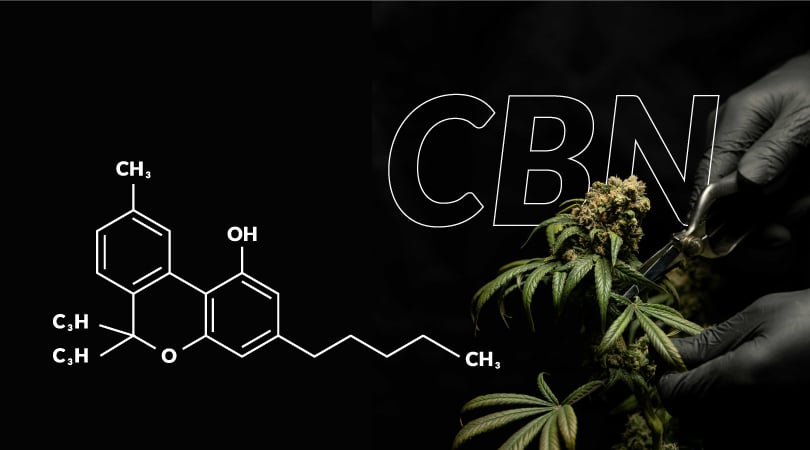
CBD vs. CBN: Understanding the Differences and Benefits
When choosing between hemp or cannabis-derived products, understanding the differences between them is crucial. Whether you’re looking to improve sleep, manage pain, or explore the potential benefits of cannabinoids, knowing which product suits your needs can make all the difference.
Most people are familiar with CBD and THC, the two most popular cannabinoids in the cannabis plant. However, other compounds like CBN are also gaining attention for their potential therapeutic benefits. In this article, we’ll explore what CBN is, how it differs from CBD, and compare their potential benefits, especially in the context of sleep.

CBD vs. CBN
The difference between CBD and CBN lies in their origin, concentration within the cannabis plant, pricing, and potential benefits.
Origin: CBD is present in significant amounts in the cannabis/hemp plant and can be directly extracted. CBN, however, is a byproduct of THC degradation, which occurs as the plant ages or is exposed to light and air.
Concentration: CBD is found in higher concentrations within cannabis, making it easier to extract. CBN, in contrast, is typically present in smaller amounts.
Pricing: Due to its abundance, CBD is often less expensive than CBN, which requires more effort to isolate and extract.
Potential Benefits: Both cannabinoids are being studied for their potential therapeutic benefits, but they interact with the body in different ways, leading to varied effects.
What Is CBN?
CBN, or cannabinol, is a minor cannabinoid found in cannabis sativa plants, typically formed as THC degrades over time or when exposed to light. Though it is less well-known than CBD and THC, CBN is gaining attention for its unique properties.
CBN interacts with the endocannabinoid system, which is a network of receptors throughout the body that influences various physiological processes. Specifically, CBN engages with CB1 and CB2 receptors, leading to its potential positive effects.
Recent studies have shown that CBN may potentially have several therapeutic benefits, including:
Sleep: CBN has been linked to improved sleep quality, particularly in reducing wakefulness during the night. Initial studies suggest that CBN can increase the duration of non-REM sleep, which is crucial for restorative rest.
Pain Relief: Preliminary research indicates that CBN, especially when combined with CBD, could potentially reduce pain without central side effects.
Anti-Inflammatory Properties: CBN has also demonstrated potential in reducing inflammation by interacting with specific receptors and pathways in the body.

What Does Science Say About CBN?
This 2024 comprehensive review explored how CBN interacts with the endocannabinoid system, highlighting its effects on pain perception, inflammation, and mood stabilization.
The study also looked into how CBN could influence other receptors like serotonin and PPARs, contributing to anti-inflammatory and antimicrobial properties.
The authors suggest that CBN could have promising applications in treating conditions like neurodegenerative disorders and infections due to its antioxidant and antimicrobial effects.
Looking into the potential CBN benefits on sleep, this 2023 study tested how CBN affects sleep in rats. It was a carefully controlled experiment where neither the researchers nor the rats knew if they were getting CBN or a placebo.
The results indicate that CBN may help the rats sleep better by increasing the amount of deep, non-REM sleep and making it easier for them to stay asleep. This suggests that CBN might be useful for improving sleep in people with sleep disorders.
Regarding the anti-inflammatory effects, this 2023 paper looked at how CBN can help reduce inflammation. The researchers found that CBN can block certain processes in the body that lead to inflammation.
As for pain management, research from 2023 explored how CBN and CBD, separately and together, can help reduce pain in rats with muscle pain.
The results suggested that CBN, especially when combined with CBD, was effective in reducing pain without causing any negative side effects. This could potentially indicate that CBN may be a useful option for managing chronic muscle pain conditions, such as fibromyalgia.
What is CBD?
CBD, or cannabidiol, is one of the most popular cannabinoids; and one of the most abundant in the cannabis plant. It doesn’t give a psychoactive effect, making it a preferred choice for those seeking potential therapeutic benefits without the “high.”
CBD is being studied for a wide range of potential benefits, including:
- Anxiety Relief: CBD is known for its calming effects, which has promoted research around its potential to help manage anxiety.
- Pain Management: CBD is also being studied as an ally in alleviating chronic pain, particularly in conditions like arthritis and multiple sclerosis.
- Anti-inflammatory: Like CBN, CBD could potentially offer anti-inflammatory properties that may help with various conditions such as tendonitis.
How Is CBN Similar to CBD?
We have discussed the differences between CBD and CBN, but what about their similarities? Here are some things they have in common:
- Source: Both CBN and CBD are compounds of the cannabis plant, although CBD is found in larger quantities.
- Products: Both CBN and CBD can be found in various forms, including oils, edibles, vapes, and topicals.
- Potential Benefits: Both are being researched for their potential to relieve pain, reduce inflammation, and improve sleep, among other benefits.
CBD vs CBN: Which Is Better for Sleep?
CBD or CBN for Sleep? Both CBD and CBN have been studied for their potential sleep benefits. While CBD is known for its potential relaxing effects, which can help with falling asleep, CBN might possibly be more effective in helping you stay asleep and improving overall sleep quality.
Legal Status of CBD and CBN
CBD Legal Status
Federal Level: CBD, derived from hemp (defined as cannabis with less than 0.3% THC), was made legal at the federal level by the 2018 Farm Bill. This means that CBD products can be legally produced, sold, and consumed across the U.S., as long as they meet the 0.3% THC threshold. However, the FDA still regulates CBD, particularly in food, beverages, and dietary supplements, where its use is not fully approved.
CBN Legal Status
Federal Level: CBN exists in a legal gray area. Unlike CBD, CBN is not explicitly addressed by the 2018 Farm Bill. Since it is often derived from THC as it degrades, some interpretations suggest it could be considered a controlled substance under the federal Controlled Substances Act, particularly if it’s extracted from marijuana rather than hemp. However, there is no clear federal regulation specifically targeting CBN.
To Sum Up – CBD vs. CBN
| Feature | CBD | CBN |
| Origin | Directly extracted from the cannabis plant | Formed as THC degrades |
| Concentration | Higher in cannabis | Lower in cannabis |
| Pricing | Generally less expensive | Typically more expensive |
| Potential Benefits | Anxiety relief, pain management, anti-inflammatory, improved sleep quality (some studies) | Sleep improvement (especially for wakefulness during the night), pain relief (especially when combined with CBD), anti-inflammatory |
| Legal Status | Federally legal in the U.S. for hemp-derived products (under 0.3% THC) | Legal status is less clear, often treated similarly to CBD but may vary by state |
| Side Effects | Generally well-tolerated, but some may experience mild side effects like drowsiness, dry mouth, or changes in appetite | Potential side effects are similar to CBD, but more limited research exists |
| Recommended Use | Can be taken orally (oils, capsules, gummies), topically, or inhaled (vapes) | Often taken orally (oils, capsules, gummies) or topically |
FAQs
Is CBN More Difficult to Produce Than CBD?
Yes, because CBN is formed as THC degrades, it is typically found in smaller amounts, making it more difficult and expensive to produce than CBD.
Is CBN More Expensive Than CBD?
Generally, yes. Due to its scarcity and the complexity of its production, CBN tends to be more expensive than CBD.
How to Take CBN?
You can take CBN through various methods, including oils, tinctures, capsules, gummies, or CBN-infused products like sleep aids. It’s best to start with a low dose and gradually increase it until you find the right amount that works for you,
CBD vs CBN vs THC: What’s the Difference?
CBD is non-psychoactive and known for its relaxing effects. CBN is also “inactive as a psychoactive”, and is a derivate of THC. On the other hand, THC is psychoactive and produces a “high”.
CBD vs CBN vs CBG: How Do They Compare?
CBD (cannabidiol), CBN (cannabinol), and CBG (cannabigerol) are all cannabinoids found in the cannabis plant, each with unique properties. CBD is the most well-known and widely used for its potential benefits like anxiety relief and pain management without the psychoactive effects.
CBN is less common and is often associated with sleep aid due to its sedative properties, while CBG, often referred to as the “mother of all cannabinoids,” is gaining attention for its potential to reduce inflammation and support neuroprotection. Though they share some similarities, each cannabinoid interacts with the body differently, offering distinct benefits.
Can You Mix CBD and CBN?
Yes, CBD and CBN can be mixed, and some products combine the two to enhance their potential benefits. However, if you are taking medication or have a particular condition, it is best to talk with your doctor before incorporating CBD and CBN into your routine.
The Takeaway
Choosing between CBD and CBN depends on your individual needs and preferences. Both cannabinoids could offer unique benefits, whether you’re looking to improve sleep, reduce pain, or manage anxiety. As research continues, we may discover even more ways these compounds can support overall health and wellness.
If you’re interested in exploring the benefits of CBD, check out our selection at Vitality and find the product that best suits your needs.
References
Gojani, E. G., Wang, B., Li, D. P., Kovalchuk, O., & Kovalchuk, I. (2023). Anti-inflammatory effects of minor cannabinoids CBC, THCV, and CBN in human macrophages. Molecules, 28(18), 6487. https://doi.org/10.3390/molecules28186487
Khouchlaa, A., et al. (2024). Health benefits, pharmacological properties, and metabolism of cannabinol: A comprehensive review. Industrial Crops and Products, 213, 118359. https://doi.org/10.1016/j.indcrop.2024.118359
Lavender, I., McCartney, D., Marshall, N., Suraev, A., Irwin, C., D’Rozario, A. L., Gordon, C. J., Saini, B., Grunstein, R. R., Yee, B., McGregor, I., & Hoyos, C. M. (2023). Cannabinol (CBN; 30 and 300 mg) effects on sleep and next-day function in insomnia disorder (‘CUPID’ study): Protocol for a randomised, double-blind, placebo-controlled, cross-over, three-arm, proof-of-concept trial. BMJ Open, 13(8), e071148. https://doi.org/10.1136/bmjopen-2022-071148
Wong, H., & Cairns, B. E. (2019). Cannabidiol, cannabinol and their combinations act as peripheral analgesics in a rat model of myofascial pain. Archives of Oral Biology, 104, 33-39. https://doi.org/10.1016/j.archoralbio.2019.05.028
